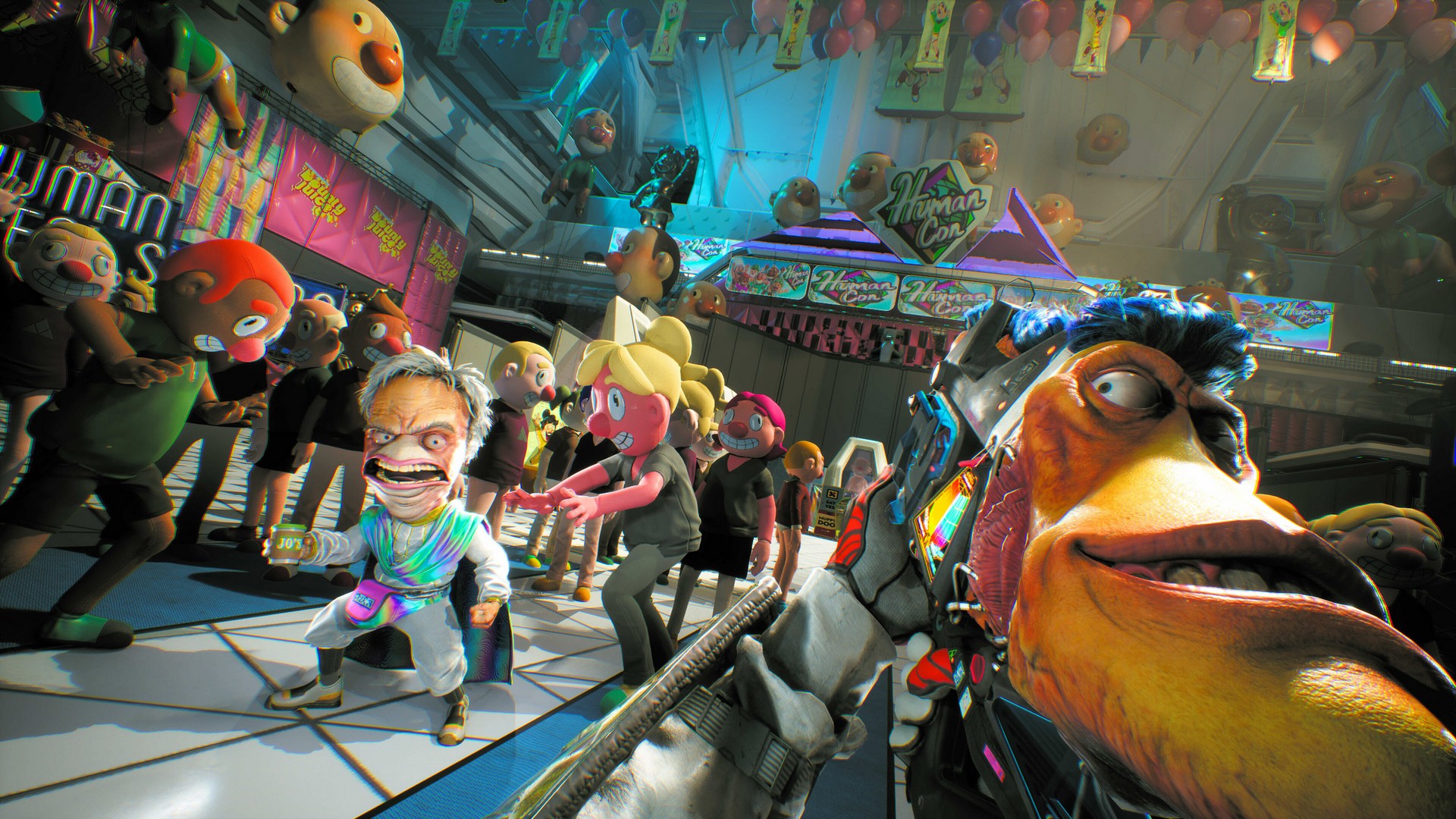127 Hours: Everything We Know
Danny Boyle puts James Franco between a rock and a hard place...
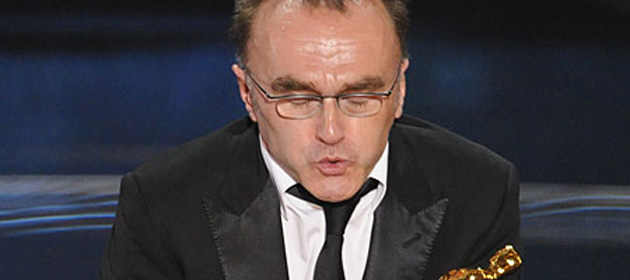
Danny Boyle: Oscar Winner
On 22nd February 2009, Danny Boyle joined the Oscar-winning directors' club.
The Lancashire lad had come a long way from his humble beginnings. After cutting his teeth in theatre productions, and then moving into TV (he directed a couple of episodes of Inspector Morse ), Boyle grabbed major amounts of attention for his gripping big screen debut, Shallow Grave .
The taut, relentlessly pacy, conversation-starting Brit-thriller set the template for what was to follow in Boyle's career, as far as any template could categorise his manic, genre-hopping energy. Shallow Grave showcased Boyle's ability to achieve great results from modest working conditions, a little-known cast, and a smart premise.
He delivered again with Trainspotting , one of the coolest Brit-flicks of the 90s, and, with the exception of his not entirely successful foray into Hollywood territory with The Beach , he's been delivering interesting movies over the past couple of decades, including zombie-reviver 28 Days Later , heartwarming kiddie caper Millions , and sci-fi horror Sunshine .
And in 2009 he directed Slumdog Millionaire . Taking the one-time hit TV show that had since lost its lustre, and tying it in with the story of the harsh lives of a trio of Indian street kids, Boyle came up with box office gold and critical backslapping to match. Receiving the Oscar was the icing on Boyle's impressive career cake, and despite the small, intimate nature of the project, it seemed perfectly suited to that win. Taking home eight of the ten awards it was nominated for (and trumping Academy-friendly fare like Milk , The Reader and Benjamin Button ), Slumdog seemed to epitomise Boyle's underdog-done-good status.
With the world now at his feet, he wasted no time taking on another project.
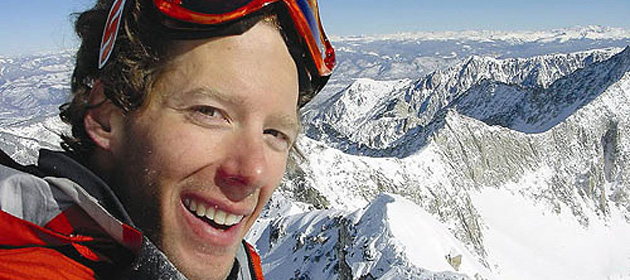
Choose (Real) Life
After the win, Boyle must have been bombarded with scripts galore, and would have gained a newfound power for commanding a much bigger budget than he would usually spend. He could've walked the blockbuster route again. He could have churned out a Slumdog clone. But he chose another surprising project (which in itself should have been no surprise at all).
Boyle used his filmmaking clout to launch a project he had been interested in for the last five years. He would tell the true story of mountain climber Aron Ralston, who was involved in an extreme, endurance-defying test in May 2003 when his arm became immovably trapped by a boulder during a climb in Utah.
Those of you wanting to go in cold and spoiler-free (and those with weak stomachs for grue) may want to skip the next few paragraphs, but you can certainly see why this incredible story grabbed Boyle's attention.
Ralston was trapped for five days under the boulder, and after his water supplies ran out, he survived by drinking his own urine. After the five days, Ralston, convinced of his impending death and becoming ever more delirious, decided that the only possible means of escape was to amputate his own arm with a cheap multi-tool he had about his person. He then escaped the canyon and hiked until he was found by a family (and then a search helicopter).
Ralston went on to write a book about his experience: entitled Between a Rock and a Hard Place , the book was read by an interested Boyle. Ralston has also carved a living as a motivational speaker for corporate events. Oh, and he still climbs mountains.
Part of the appeal from Boyle's perspective was the fact that Ralston documented so much of his life in the form of photos and video diaries. "This guy took a video camera with him, he filmed himself every day… And this was before YouTube but he was obsessed with documenting everything."
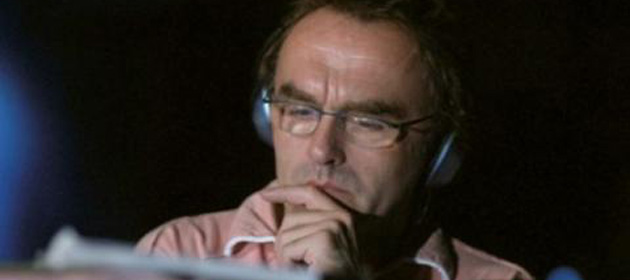
The Challenge
Boyle is never one to repeat past successes, and he actively challenges himself when it comes to making movies. Seeking something totally different to what he had done before, he was inspired by the thought of telling this confined, claustrophobic survival story.
It ticks all the boxes: fresh genre for Boyle (the survival drama, true story); it eschews standard storytelling tropes; it has a neat, compelling concept; there's a challenge.
The challenge being: how do you make a gripping movie with one immobile guy in the lead. Boyle describes 127 Hours as "an action movie with a guy who can't move".
"It's like that's the challenge, because you can't rely on location, the cut, the incidental characters, the villain: there's just you."
For Boyle, it offered the opportunity to revisit the digital cameras developed for Slumdog , for an immediate, terse, cramped shooting style. Early script reviews have 127 Hours pegged as largely dialogue-free, though it's likely that we'll have to wait until the curtains are up before we find out what Boyle has done with the boulder-weighted scenes (we expect him to have given his lead actor a good degree of improvisational freedom with his confined setting).
The trailer gives nothing away save for some frenetic, adventuring build-up to the life-changing moment. Secrecy on Boyle's part, or a studio ruse to kid the potential audience that this won't be a 'one man, one room' job? Who knows, but let's not forget that Slumdog Millionaire was marketed as 'the feel-good film of the decade'.
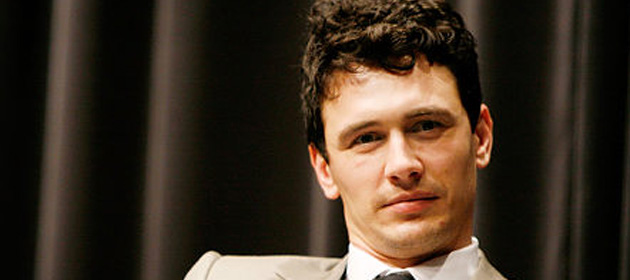
Finding the actor
One thing was certain, Boyle would have to find one hell of an actor to take on such a punishing, and unforgiving role.
At the rumour stage, Cillian Murphy (a twice-capped member of the Boyle movie-club) was initially believed to be the favourite in the running, and Ryan Gosling was also apparently in contention, but the gig eventually went to James Franco.
Perhaps a little better recognised than some of Boyle's previous leads (thanks in no small part to his role in the Spider-Man trilogy), Franco is still not quite A-list, and since Sam Raimi's superhero trilogy, he's often been seen favouring small-scale interesting projects ( Milk , Howl ) over bigger-budget fare.
It seems fair to call 127 Hours his toughest project yet, in terms of shooting conditions and what will be required of him, but Boyle has plenty of faith: "I think we thought he's always been underrated… He wasn't an obvious choice but he was great, so we asked him to do it."
"I hope that everyone will see what a great actor he is in it. And there's a little Pineapple Express bit in there to cheer everyone up in the middle."
It should certainly be a change of pace from Your Highness anyway.
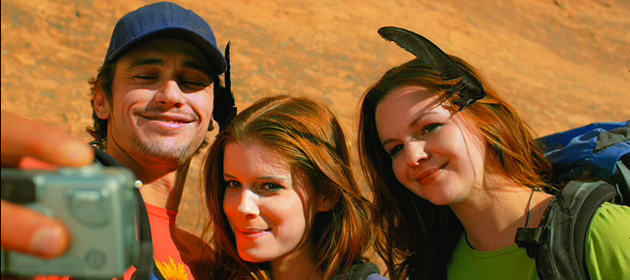
Providing Support
Despite the fact that Franco will be mainly playing off the troublesome rock, and his fizzog will be very much front and centre, Boyle and co have still managed to cram a few interesting faces into the pic to give Franco some back-up.
Clémence Poésy, the French actress seen in Harry Potter and the Goblet of Fire and In Bruges will play Ralston's lover, and True Blood 's Lizzy Caplan is Ralston's sister Sonja. It's not yet known whether the movie (like Ralston's autobiography) will oscillate between the canyon confinement and flashbacks to the past, or whether we will be stuck with Ralston throughout his entire struggle.
Caplan doesn't give much away: "I play his sister. But a lot of the movie is James Franco dealing with his arm being trapped by a boulder."
Also joining the cast are Amber Tamblyn and Kate Mara as fellow hikers that Ralston meets early on his journey (they get a fair amount of screen time in the trailer ), who could prove to be the final faces he sees (apart from his own recorded monologues to his video camera).
Treat Williams is also showing up as Ralston Sr, but don't expect any of these guys to nab a huge amount of screentime, as Boyle is primarily concerned with putting Ralston's experience right at the forefront.
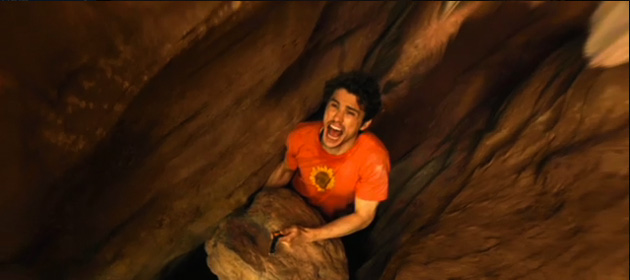
Taking the audience there
The huge task that Boyle, and the film's marketing bods, have ahead of them with 127 Hours , is convincing the audience that they want to take part in this endurance test. Whatever the outcome, it doesn't seem very likely that it'll be one you watch again and again.
"If you trap the audience, then you're invested in it, Boyle" stated. He was certain he didn't want to go down the documentary route, a la Touching the Void , and instead decided to grapple with this tough approach.
Franco and the crew weren't given any luxuries when it came to the shoot, with everyone cramming into a tiny set for the (in)action. Franco was given the relief of having two cameramen to play off, with Boyle's intention being to produce a kind of 'good cop; bad cop' dynamic.
And they had another plan to make the shoot a little more bearable...
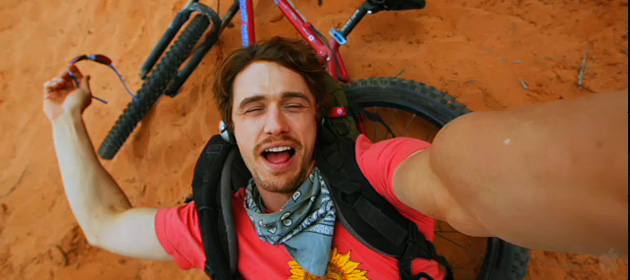
They didn't waste any time
Adding to Boyle's love of a challenge, he and producer Christian Colson rattled this one off with impressive pace.
The movie began shooting in March, and 127 Hours is set to be shown at the Toronto Film Festival on 12 September 2010. The speed was made possible by the digital cameras developed for Slumdog , meaning high-quality results could be gleaned from fast, agile equipment. It also meant that James Franco would be able to survive the restrictive shoot with his sanity (mostly) in tact.
"It was more of a sprint than an endurance test for the crew," Colson said. "Because we were working in very dangerous conditions on location and on a very small set in a factory. So we worked at an incredible pace or everyone would have gone mad."
It was also an effort to capture the horrifying, but defiantly real, event in all its brutality. There's no time for Hollywood gloss. In fact, despite the fact is is set in America and features an American actor, playing an American mountaineer, Boyle and Colson maintain that the movie is still resolutely British.
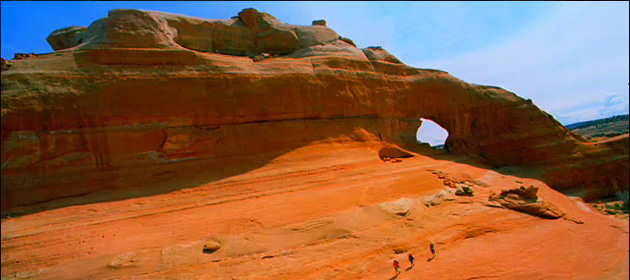
A Very British Sensibility
After his foray into Hollywood politics with The Beach , Boyle's output has remained impressively British, even for the decently-budgeted Sunshine , and the Mumbai-set (and filmed) Slumdog .
Despite the fact that 127 Hours is seemingly very American, Boyle and Colson are convinced that the end result will ultimately feel like a British product.
Based on a script by Slumdog scribe Simon Beaufoy (from a treatment by Boyle), the director claims everything bar the script was done in the UK, including all pre-and-post production and all the work on the story.
The freedom that Boyle is afforded by making these modestly-budgeted Brit-flicks allows him to tell the story in his unique, non-standard way, with a minimal amount of outside interference in the project.
Boyle reckons: "It's got a sensibility in it that's unusual really, and I think when you see it you'll think it's British."
For those unable to catch 127 Hours at one of the film festivals it's appearing at, it's due to hit US cinemas on November 5th 2010, with the UK following (bah!) on January 5th 2011.
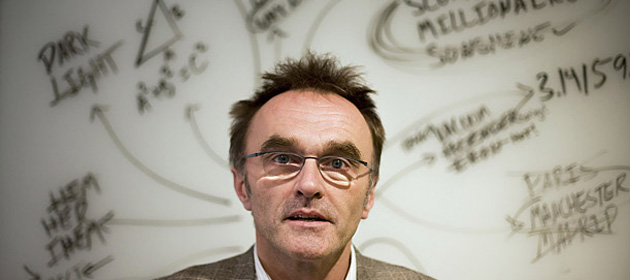
What's next for Boyle
127 Hours is getting an airing at the Toronto Film Festival, and it's set to close the London Film Festival on 28 October 2010. As the dust is settling on 127 Hours , Boyle will be overseeing the opening ceremony of the 2012 London Olympics, alongside fellow director Stephen Daldry.
Boyle said: "When they offered us the job, they said, 'Do you want to think about it? I said, 'No, I want to do it' … It's a completely unique opportunity to contribute to what I'm sure will be a fantastic games. I'm really excited to be involved."
At least that's one thing everyone in the UK can have to not be embarrassed about when the Olympics start in summer 2012.
On the movie front, it's impossible to second guess what Boyle will do next. He frequently claims that he'd love to do an original musical, and he has also expressed interest in animation. But for now, who knows?
There's always the possibility that he'll return to adapt Irvine Welsh's Trainspotting sequel Porno , although perhaps that would be a little too samey for him…
The Total Film team are made up of the finest minds in all of film journalism. They are: Editor Jane Crowther, Deputy Editor Matt Maytum, Reviews Ed Matthew Leyland, News Editor Jordan Farley, and Online Editor Emily Murray. Expect exclusive news, reviews, features, and more from the team behind the smarter movie magazine.
Weekly digests, tales from the communities you love, and more
You are now subscribed
Your newsletter sign-up was successful
Want to add more newsletters?

Every Friday
GamesRadar+
Your weekly update on everything you could ever want to know about the games you already love, games we know you're going to love in the near future, and tales from the communities that surround them.

Every Thursday
GTA 6 O'clock
Our special GTA 6 newsletter, with breaking news, insider info, and rumor analysis from the award-winning GTA 6 O'clock experts.

Every Friday
Knowledge
From the creators of Edge: A weekly videogame industry newsletter with analysis from expert writers, guidance from professionals, and insight into what's on the horizon.

Every Thursday
The Setup
Hardware nerds unite, sign up to our free tech newsletter for a weekly digest of the hottest new tech, the latest gadgets on the test bench, and much more.

Every Wednesday
Switch 2 Spotlight
Sign up to our new Switch 2 newsletter, where we bring you the latest talking points on Nintendo's new console each week, bring you up to date on the news, and recommend what games to play.

Every Saturday
The Watchlist
Subscribe for a weekly digest of the movie and TV news that matters, direct to your inbox. From first-look trailers, interviews, reviews and explainers, we've got you covered.

Once a month
SFX
Get sneak previews, exclusive competitions and details of special events each month!
